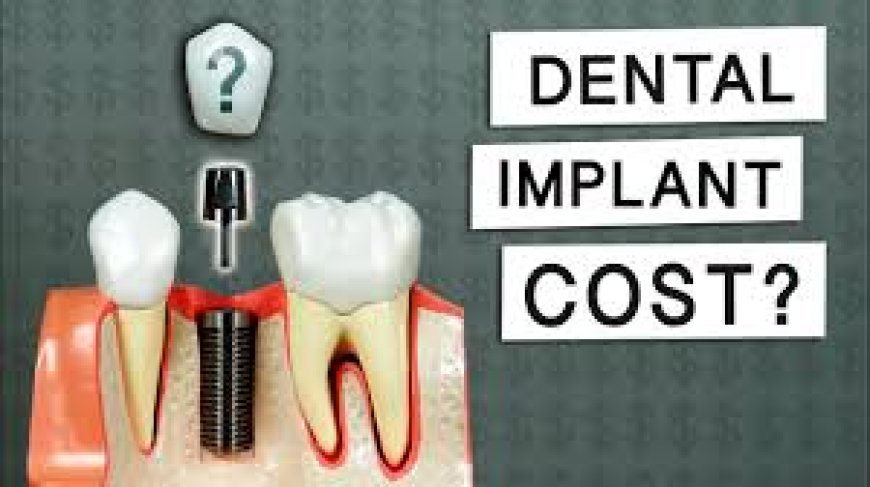Cost of Dental Implants: Pricing and Options Explained
Learn about the cost of dental implants, factors affecting pricing, financing options, and long-term benefits for a healthier smile. Make informed decisions!

Dental implants have revolutionized the way we approach tooth replacement, offering a durable and natural-looking solution for missing teeth. However, one of the most significant factors that potential patients consider is the cost of dental implants.
Understanding this cost is crucial for making informed decisions about dental health and financial planning. In this article, we will delve into the various aspects influencing the cost of and help you gain a clearer understanding of what to expect.
What Are Dental Implants?
Dental implants are artificial tooth roots that are surgically placed into the jawbone to support replacement teeth or bridges. They are made of biocompatible materials, typically titanium, which integrates well with the bone.
The process involves three main components: the implant post, the abutment, and the crown. The implant post serves as the root, the abutment connects the post to the crown, and the crown is the visible part that resembles a natural tooth.
Implants provide a stable foundation for replacement teeth, enabling patients to eat, speak, and smile with confidence. Unlike dentures, which can slip or move, dental implants are securely anchored in place, providing a long-term solution for tooth loss.
Factors Influencing the Cost of Dental Implants
Material Quality
One of the primary factors affecting the dental implants cost is the quality of materials used. Implants are typically made from titanium or zirconia. Titanium is the most commonly used material due to its durability and compatibility with bone.
However, high-quality titanium implants come at a premium price. Zirconia implants are an alternative that some patients prefer for aesthetic reasons, but they may also be more expensive.
Type of Implant
The type of dental implant chosen can also significantly influence the overall cost. Traditional implants, which involve a surgical procedure to place a post in the jawbone, tend to be more expensive than mini implants. Mini implants are smaller in diameter and require less invasive procedures, making them a more affordable option for some patients.
However, mini implants may not be suitable for every patient, especially those with significant bone loss. Understanding the differences between these types of implants is essential for making an informed decision based on your specific dental needs.
Geographical Location
The dental implant cost can vary greatly depending on geographical location. Urban areas with a higher cost of living typically charge more for dental procedures than rural areas. For instance, dental implant costs in metropolitan cities may be significantly higher than in smaller towns.
Patients should research the average costs in their area and consider traveling to a different location if it means significant savings. However, it's crucial to balance cost with the quality of care and the reputation of the dental provider.
Complexity of the Procedure
The complexity of the dental implant procedure can also impact the overall cost. If a patient requires additional procedures, such as tooth extractions or bone grafting, the total expenses will increase. Bone grafting is often necessary for patients who have experienced bone loss, as it provides the necessary foundation for the implant.
Dentist’s Experience and Reputation
The experience and reputation of the dentist performing the procedure can influence the cost of dental implants. Highly skilled and experienced dental professionals may charge more for their services, but they also bring expertise that can lead to better outcomes.
Patients should look for dentists who specialize in implantology and have a proven track record of successful procedures. While cost is an important factor, the quality of care should be a top priority when choosing a dental provider.
Breakdown of Costs Associated with Dental Implants
Initial Consultation
The journey to obtaining dental implants begins with an initial consultation, which often includes diagnostic imaging such as X-rays or CT scans. This consultation is essential for assessing the patient's oral health and determining the best treatment plan.
The costs for this initial visit can vary but typically range from $100 to $300. Some dental practices may offer free consultations or apply the consultation fee toward the overall treatment cost if the patient proceeds with the implants.
Surgical Procedure
The surgical procedure to place the dental implants is one of the most significant expenses. The cost of the surgery can range from $1,000 to $3,000 per implant, depending on various factors, including the complexity of the procedure and the geographical location.
Abutment and Crown
After the implant post is successfully placed and has had time to integrate with the jawbone, the next step involves placing the abutment and crown. The abutment connects the implant post to the crown, while the crown serves as the visible part of the tooth.
The cost of the abutment can range from $300 to $500, while the crown typically costs between $1,000 and $2,500, depending on the material used. Understanding these additional costs is crucial for budgeting the overall expense of dental implants.
Follow-Up Visits
After the initial surgery and placement of the abutment and crown, patients will require follow-up visits to monitor healing and ensure proper function. These visits may incur additional costs, typically ranging from $50 to $150 per appointment.
Average Cost of Dental Implants
On average, the dental implant cost can range from $3,000 to $4,500 per implant. However, this figure can vary based on the factors discussed earlier. Patients should expect to pay more if additional procedures are required or if they choose a highly reputable dental provider.
It's essential to gather estimates from multiple dental practices to compare costs and services offered. Additionally, some dental clinics may offer packages that include the entire implant process at a bundled rate, which can provide cost savings.
Conclusion
Understanding the cost of dental implants is essential for making informed decisions about dental health. With various factors influencing the price, including material quality, procedure complexity, and geographical location, patients should thoroughly research and discuss their options with dental professionals.
What's Your Reaction?














![Noots Focus Reviews [Truth Exposed 2025]!](https://news.bangboxonline.com/uploads/images/202501/image_430x256_678e3b94881a1.jpg)
![Vivalis Male Enhancement: The Must-Know Ingredients [2025 Update]](https://news.bangboxonline.com/uploads/images/202501/image_430x256_678e3b54e396c.jpg)










